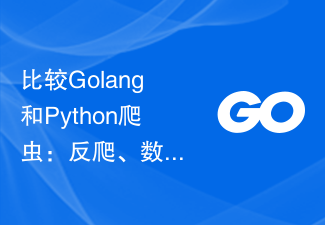The steps for crawler development using go language are as follows: 1. Select the appropriate library, such as GoQuery, Colly, PuerkitoBio and Gocolly, etc.; 2. Select the appropriate library and obtain the returned response data; 3. Parse HTML , extract the required information from the web page; 4. Concurrent processing, greatly improving crawling efficiency; 5. Data storage and processing; 6. Scheduled tasks; 7. Anti-crawler processing.

The operating system for this tutorial: Windows 10 system, Go version 1.21, DELL G3 computer.
Go language has a strong performance in crawler development, mainly relying on its concurrency features and lightweight goroutine mechanism. The following are the main steps and common tools for crawler development in Go language:
1. Choose the appropriate library:
Go language has many mature web crawler libraries , such as GoQuery, Colly, PuerkitoBio and Gocolly, etc. These libraries provide convenient APIs and rich functions to help developers quickly build crawler programs.
2. Send HTTP requests:
In Go language, you can use the net/http package in the standard library to send HTTP requests. You can easily send requests to the target website through methods such as http.Get or http.Post and obtain the returned response data.
3. Parse HTML:
Choosing the appropriate HTML parsing library can help us extract the required information from the web page. The more commonly used libraries include GoQuery and PuertokitoBio/goquery, which provide syntax similar to jQuery, which can easily parse and filter HTML elements.
4. Concurrent processing:
Using the goroutine mechanism of the Go language, concurrent crawling can be easily realized. By starting multiple concurrent goroutines to handle multiple crawling tasks at the same time, crawling efficiency can be greatly improved.
5. Data storage and processing:
The obtained data can be stored in memory or written to persistent storage media such as files and databases. In the Go language, you can choose to use built-in data structures and file operation functions, or you can combine it with third-party libraries for data storage and processing.
6. Scheduled tasks:
In crawler development, scheduled tasks are often required, such as regularly crawling and updating websites. You can use the Time package of Go language to implement scheduling and execution of scheduled tasks.
7. Anti-crawler processing:
When developing crawlers, you need to note that the website may set anti-crawler strategies, such as detecting access frequency, setting verification codes, etc. Developers can circumvent anti-crawler strategies by properly setting user agent information and limiting request frequency.
The following is a simple example to demonstrate the basic process of crawler development using Go language and goquery library:
package main
import (
"fmt"
"log"
"strings"
"github.com/PuerkitoBio/goquery"
)
func main() {
url := "https://example.com"
doc, err := goquery.NewDocument(url)
if err != nil {
log.Fatal(err)
}
doc.Find("a").Each(func(i int, s *goquery.Selection) {
href, _ := s.Attr("href")
text := strings.TrimSpace(s.Text())
fmt.Printf("Link %d: %s - %s\n", i, text, href)
})
}In this example, we first imported the goquery library, and then used NewDocument Method to obtain the content of the specified web page. Next, use the Find and Each methods to traverse all links in the web page and output the link text and URL.
It should be noted that when conducting actual crawler development, we also need to pay attention to legality, privacy, terms of service and other related issues to ensure that our crawler behavior complies with legal and ethical norms. At the same time, you also need to pay attention to the ethical use of web crawlers. When crawling content, you must follow the robots.txt rules of the website, respect the wishes of the website owner, and avoid unnecessary pressure on the website.
In actual crawler development, it is necessary to select appropriate strategies and tools based on specific tasks and the characteristics of the target website, while maintaining continuous learning and practice to improve the efficiency and stability of the crawler.
The above is the detailed content of How to develop crawler in go language. For more information, please follow other related articles on the PHP Chinese website!
 go语言有没有缩进Dec 01, 2022 pm 06:54 PM
go语言有没有缩进Dec 01, 2022 pm 06:54 PMgo语言有缩进。在go语言中,缩进直接使用gofmt工具格式化即可(gofmt使用tab进行缩进);gofmt工具会以标准样式的缩进和垂直对齐方式对源代码进行格式化,甚至必要情况下注释也会重新格式化。
 go语言为什么叫goNov 28, 2022 pm 06:19 PM
go语言为什么叫goNov 28, 2022 pm 06:19 PMgo语言叫go的原因:想表达这门语言的运行速度、开发速度、学习速度(develop)都像gopher一样快。gopher是一种生活在加拿大的小动物,go的吉祥物就是这个小动物,它的中文名叫做囊地鼠,它们最大的特点就是挖洞速度特别快,当然可能不止是挖洞啦。
 tidb是go语言么Dec 02, 2022 pm 06:24 PM
tidb是go语言么Dec 02, 2022 pm 06:24 PM是,TiDB采用go语言编写。TiDB是一个分布式NewSQL数据库;它支持水平弹性扩展、ACID事务、标准SQL、MySQL语法和MySQL协议,具有数据强一致的高可用特性。TiDB架构中的PD储存了集群的元信息,如key在哪个TiKV节点;PD还负责集群的负载均衡以及数据分片等。PD通过内嵌etcd来支持数据分布和容错;PD采用go语言编写。
 go语言是否需要编译Dec 01, 2022 pm 07:06 PM
go语言是否需要编译Dec 01, 2022 pm 07:06 PMgo语言需要编译。Go语言是编译型的静态语言,是一门需要编译才能运行的编程语言,也就说Go语言程序在运行之前需要通过编译器生成二进制机器码(二进制的可执行文件),随后二进制文件才能在目标机器上运行。
 go语言能不能编译Dec 09, 2022 pm 06:20 PM
go语言能不能编译Dec 09, 2022 pm 06:20 PMgo语言能编译。Go语言是编译型的静态语言,是一门需要编译才能运行的编程语言。对Go语言程序进行编译的命令有两种:1、“go build”命令,可以将Go语言程序代码编译成二进制的可执行文件,但该二进制文件需要手动运行;2、“go run”命令,会在编译后直接运行Go语言程序,编译过程中会产生一个临时文件,但不会生成可执行文件。
 比较Golang和Python爬虫:反爬、数据处理和框架选择的差异分析Jan 20, 2024 am 09:45 AM
比较Golang和Python爬虫:反爬、数据处理和框架选择的差异分析Jan 20, 2024 am 09:45 AM深入探究Golang爬虫和Python爬虫的异同:反爬应对、数据处理和框架选择引言:最近几年来,随着互联网的迅速发展,网络上的数据量呈现爆炸式的增长。爬虫作为一种获取互联网数据的技术手段,受到了广大开发者的关注。两种主流语言,Golang和Python,各自都有自己的优势和特点。本文将深入探究Golang爬虫和Python爬虫的异同点,包括反爬应对、数据处理


Hot AI Tools

Undresser.AI Undress
AI-powered app for creating realistic nude photos

AI Clothes Remover
Online AI tool for removing clothes from photos.

Undress AI Tool
Undress images for free

Clothoff.io
AI clothes remover

AI Hentai Generator
Generate AI Hentai for free.

Hot Article

Hot Tools

Zend Studio 13.0.1
Powerful PHP integrated development environment

Dreamweaver CS6
Visual web development tools

EditPlus Chinese cracked version
Small size, syntax highlighting, does not support code prompt function

ZendStudio 13.5.1 Mac
Powerful PHP integrated development environment

SublimeText3 Linux new version
SublimeText3 Linux latest version








